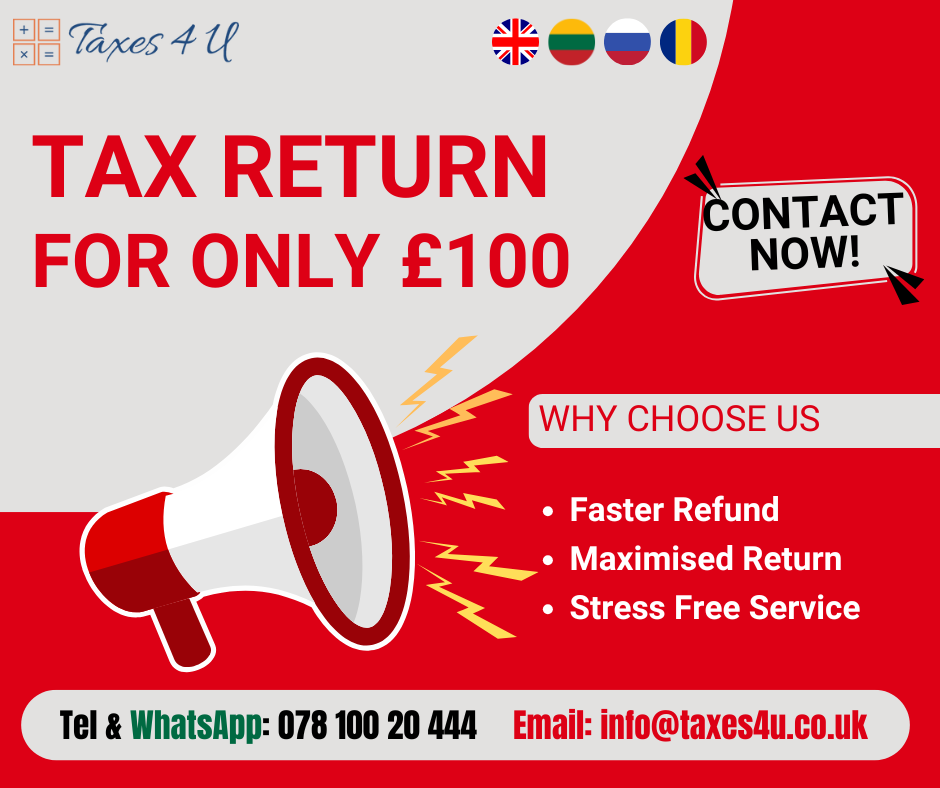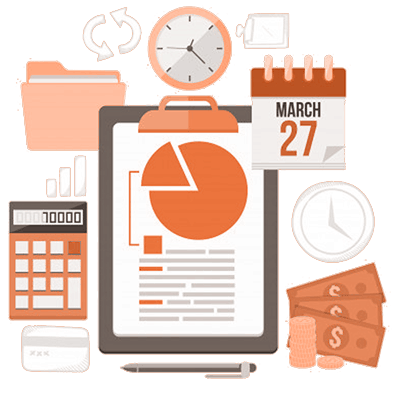 Promotion: Tax Refund Cost £120 → £100!
Promotion: Tax Refund Cost £120 → £100! 
Tax Refund
What we offer
If you have overpaid your Income Tax in the last 4 financial years we can help you to get a Tax Refund. Do not wait to get your money back.
Most likely reasons of tax overpayments
A Tax Refund is a refund of tax which has been overpaid. There are a number of reasons why tax may have been overpaid, including:
- You worked in the Construction Industry Scheme (CIS) as a Subcontractor
- You have not worked the full financial year (tax year)
- You start a new job and are taxed under an emergency code for a while
- HM Revenue and Customs (HMRC) sends the wrong Tax Code to your employer or your employer does not use the correct code
- You are self-employed and you make payments on account for the following year, under the Self Assessment scheme. These payments are too high because of a change in your circumstances, for example, there has been a downturn in your business. You have not made a claim to reduce your payments on account and your final tax liability turns out to be less than the tax you have actually paid
- You have more than one job. The employer at your second job will automatically deduct tax at basic rate so you may not get the benefit of all your tax-free personal allowances. This will frequently apply if you are a student or low-paid worker
Our Price
🔥 Promotion: £120 → £100! Contact us now before the offer ends! 🔥
Self Assessment Tax Return
What we offer
We will calculate your Self Assessment Tax Return and advise on what expenses and allowances can be claimed so you will not overpay your Income Tax anymore!
Self Assessment
Self Assessment is a system HM Revenue and Customs (HMRC) uses to collect Income Tax.
Tax is usually deducted automatically from wages, pension and savings. People and businesses with other income must report it in a Tax Return. You must send a Tax Return if in the last tax year (6 April to 5 April) you were:
- Self-employed as a sole trader and earned more than £1000
- A Partner in a business partnership
You will not usually need to send a Tax Return if your only income is from your wages or pension. But you may need to send one if you have any other income, such as:
- Money from renting out a property
- Tips and commission
- Income from savings, investments and dividends
- Foreign income
- If you get Child Benefit and your income (or your partner's, if you have one) was over £60,000 you may need to send a return and pay the Higher Income Child Benefit Charge
Our Price
From £60*
*Price may vary, depends on complexity of calculation
Self-Employed allowable expenses
Overview
If you are self-employed, your business will have various running costs. You can deduct some of these costs to work out your taxable profit as long as they are allowable expenses.
Example:
Your turnover is £30,000, and you claim £5,000 in allowable expenses. You only pay tax on the remaining £25,000 - known as your taxable profit.
Allowable expenses do not include money taken from your business to pay for private purchases.
Costs you can claim
As allowable expenses:
- office costs, for example stationery or telephone bills
- travel costs, for example fuel, parking, train or bus fares
- clothing expenses, for example uniforms
- staff costs, for example salaries or subcontractor costs
- things you buy to sell on, for example stock or raw materials
- financial costs, for example insurance or bank charges
- costs of your business premises, for example heating, lighting, business rates
- advertising or marketing, for example website costs
- training courses related to your business, for example refresher courses
- if you buy a car for your business, you can claim this as a capital allowance.
You cannot claim expenses if you use your £1,000 tax-free 'trading allowance'. The trading allowance is a tax exemption of up to £1000 a year for individuals with trading income.
How long to keep your records
You must keep your records for at least 5 years after the 31 January submission deadline of the relevant tax year. HM Revenue and Customs (HMRC) may check your records to make sure you are paying the right amount of tax.
Example:
If you sent your 2023 to 2024 tax return online by 31 January 2025, you must keep your records until at least the end of January 2030.



